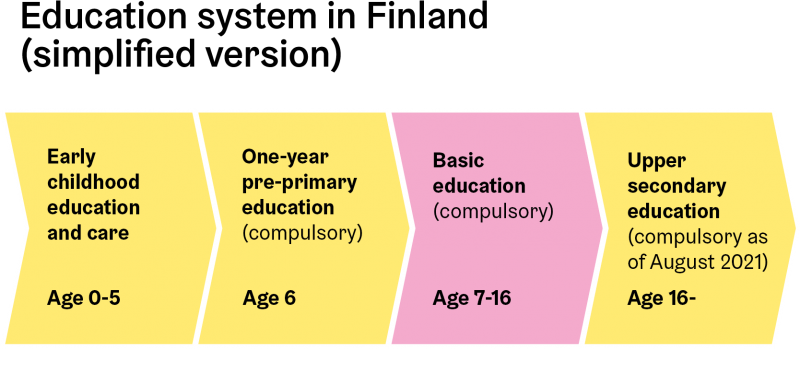10 Facts about basic education in Helsinki
1
In Finland, everybody has a constitutional right to basic education free of charge.
2
Basic education is compulsory for all children living permanently in Finland. It starts in the year a child turns seven. Before the beginning of basic education, children must attend one year of pre-primary education in the year they turn six.
3
In some cases, children can start school a year before or after the year they turn seven. However, this requires an expert opinion and an official decision to make sure that it is the best solution for the child.
4
Basic education covers grades 1-9. Until recently, compulsory schooling has ended after finishing basic education (or when a person turns 17). In August 2021, compulsory schooling was extended to the age of 18, which means that from now on, young people will have to move on to study in upper secondary education.

5
City of Helsinki offers all residents a place in Finnish-language or Swedish-language basic education at their local school.
6
Children and young people with no previous Finnish or Swedish skills are offered a place in preparatory education to help them acquire basic skills in one of the national languages.
7
Pupils whose mother tongue is not Finnish or Swedish can also participate in additional mother tongue instruction in their own language, or in a language they have acquired while living in another country.
8
In addition to basic education taught in Finnish and Swedish, schools in Helsinki offer basic education in several different languages, with instruction either completely in the target language or as bilingual education.
9
Most schools in Helsinki are municipal, which means that they are run by the City of Helsinki. In addition to this, there are some privately run schools that cooperate with the City of Helsinki. These schools serve as local schools for pupils living in their area, and they all follow the same policies regarding admissions.
10
There is also a handful of private and state-owned schools in Helsinki that operate independently. Most of these schools serve the needs of a particular language group, or have a special pedagogical or religious mission. These schools follow their own policies concerning admissions and fees. Private school options are introduced briefly on the Other alternatives page.

